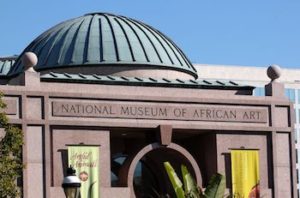
The National Museum of African Art
This date in 1964 celebrates the National Museum of African Art (NMAA) in Washington, D.C. Diplomat Warren M. Robbins established it as a private museum, which officially became part of the Smithsonian Institution in August 1979.
The museum was originally housed in the Washington residence of Black abolitionist Frederick Douglass. It celebrates the visual arts and cultures of Africa and opened in a new building on the National Mall on this date in 1989.
The National Museum collects and exhibits art from throughout Africa. The collection dates from antiquity to the present. It includes traditional masks and figures, textiles, costumes and jewelry, furniture and household objects, architectural elements, and modern sculpture, paintings, prints, and ceramics. Notable aspects of the collection include objects from the Republic of Benin that illustrate life in that region of western Africa between the 14th century and the beginning of French rule at the end of the 19th century.
The museum's utilitarian objects, stools, headrests, baskets, vessels, and other items reflect African art's blend of form and function. Remarkable examples of pottery from central Africa and textiles from sub-Saharan Africa also represent African art and cultural richness. The exhibition program highlights the permanent collection and includes traveling exhibitions from other institutions.
Various public programs introduce the public to the richness of traditional African arts and cultures. Researchers can consult the museum's Photographic Archives, which has more than 300,000 photographic images and extensive film and video footage for a visual record of life and art in Africa.
